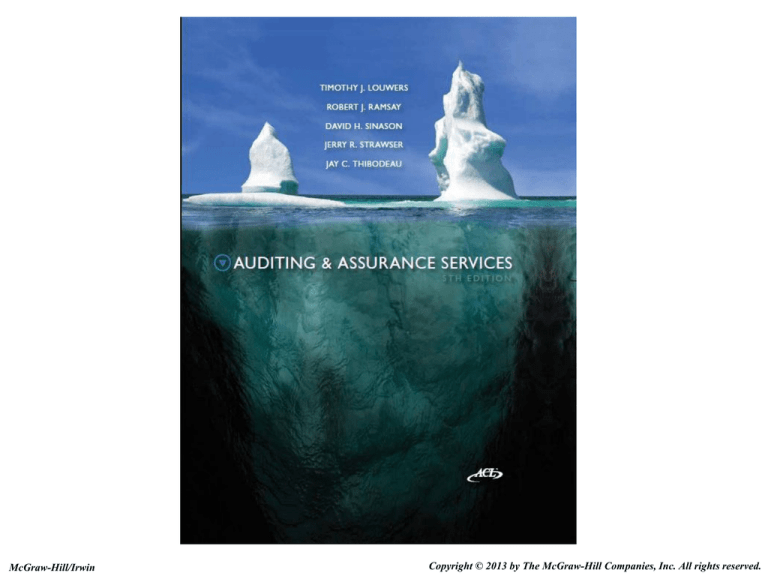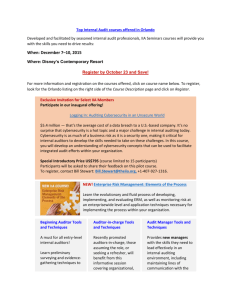
McGraw-Hill/Irwin
Copyright © 2013 by The McGraw-Hill Companies, Inc. All rights reserved.
Chapter 11
Completing the Audit
“It ain’t over till it’s over.”
– Yogi Berra, former catcher for the New York Yankees
11-2
Timeline for Major Activities
in Audit
Beginning
of year
Year-End Date
(date of the Financial
Statements)
Interim testing (tests
of controls and
substantive
procedures
Date of the auditors’ report
(audit completion date)
• Completing substantive
procedures
• Attorney’s letters
• Written representations
• Going-concern assessment
• Adjusting journal entries
• Audit documentation review
• Subsequent events
Subsequently
discovered facts
Audit report
release date
• Subsequently
discovered facts
• Omitted audit
procedures
• Management letter
• Communications
with those charged
with governance
11-3
Completing Substantive
Procedures
• Roll-forward procedures: Extend work from interim
period to date of the financial statements
• Perform analytical procedures to identify unusual or
unexpected relationships not previously identified
• Review accounts for “miscellaneous”, “other,” and
“clearing” accounts (may relate to earnings
management)
• Evaluate management estimates and process for
developing estimates for reasonableness
11-4
Procedures for Litigation,
Claims, and Assessments
• Inquiry of clients
• Review minutes of meetings of stockholders,
directors, and committees
• Review contracts, loan agreements, and
correspondence from taxing and governmental
agencies
• Obtain information concerning guarantees from bank
confirmations
• Review documentation related to legal services
• Attorney’s letters
11-5
Attorney’s Letters
Responsibilities for Attorney’s
Letter
•
Auditors
–
•
Client
–
–
•
Initiate request for attorney letter
Prepare listing, description, and
evaluation of litigation, claims, and
assessments for letter
Send letter to attorney including
information related to litigation, claims,
and assessments
Attorney
–
Respond to auditors regarding client’s
description of litigation, claims, and
assessments contained in attorney letter
Contents of Attorney’s Letter
• Listing of pending litigation,
claims, and assessments
• Description of each item or
case included in the listing
• Evaluation of the likelihood
of an unfavorable outcome
• Estimate of the range of
potential loss
• Understanding regarding
unasserted claims
11-6
Written Representations
• Provided by management to auditors
• Dated using date of auditors’ reports (audit completion
date)
• Broad purpose
– Impress upon management its primary responsibility for the
financial statements
– May establish auditors’ defense if a question related to inquiries
subsequently arises
• Qualify or disclaim an opinion if not provided by the client
11-7
Contents of Written
Representations
• Information related to financial statements
– Management’s responsibility for F/S and internal control
over financial reporting
– Appropriate disclosure, presentation, and reasonableness of
items
– Statement that uncorrected misstatements are immaterial
• Information provided to auditors by management
• Internal control over financial reporting (for public
entities)
11-8
Other Procedures Performed
Prior to Date of Auditors’ Report
•
Consider whether evidence obtained during audit raises questions about
ability to continue as a going concern
•
Accumulate identified misstatements and evaluate need for adjustments to
financial statements
•
–
Rollover method considers the current period income effect(s) of misstatements
–
Iron curtain method considers the aggregate effect of the adjustments on the entity’s
balance sheet
Review of audit documentation
–
Supervisor: Have all steps been performed?
–
Manager and partner: Scope of audit and support for conclusions
–
Reviewing partner: Consistency of work and reporting with quality standards of the firm
(engagement quality review)
11-9
Subsequent Events/
Subsequently Discovered Facts
Beginning
of year
Year-End Date
(date of the financial
statements)
Date of the auditors’ report
(audit completion date)
Subsequent
Events
Audit report
release date
Subsequently
Discovered Facts
• Subsequent events occur between the date of the
financial statements and date of the auditors’ report
• Subsequently discovered facts become known after the
date of the auditors’ report
11-10
Procedures to Identify
Subsequent Events
• Obtain understanding of procedures management
performs to identify subsequent events
• Inquire of management and those charged with
governance
• Read minutes of meetings of owners, management,
and those charged with governance
• Review entity’s interim financial statements
11-11
Auditors’ Response
• If discovered prior to date of auditors’ reports, perform procedures
and evaluate disclosure
• If discovered prior to audit report release date, perform procedures
– Revise date of auditors’ reports to reflect new completion date
– Dual date auditors’ reports
• If discovered following audit report release date: If facts would result
in revision of auditors’ report or F/S and individuals are relying on F/S
– Notify individuals relying on F/S
– Issue revised F/S which provide disclosure of facts
11-12
Omitted Procedures
• Perform procedures if:
– Omitted procedures are important
– Individuals are currently relying on financial statements and
auditors’ reports
• If previous opinion can be supported, no further
action necessary
• If previous opinion cannot be supported
– Withdraw the original report
– Issue revised reports
– Inform persons currently relying on the financial statements
11-13
Communication with Individuals
Charged with Governance
• Auditors’ responsibility under
GAAS
• Material, uncorrected
misstatements
• Overview of planned scope and
timing of audit
• Representations requested
from management
• Judgment about quality of
accounting policies, estimates,
and disclosures
• Management consultations
with other auditors
• Significant difficulties
encountered during audit
• Uncorrected misstatements
• Disagreements with
management
• Significant issues discussed
with management
• Other findings or issues
significant and relevant to
those charged with governance
11-14
Summary of Audit
Communications
Type
From
To
Timing
Method
Engagement letter Auditors
Client
Before
engagement
Written
Acceptance letter
Client
Auditors
Before
engagement
Written
Attorney letter
response
Attorney
Auditors
Near date of
Written
auditors’ report
Written
representations
Client
Auditors
Date of
Written
auditors’ report
11-15
Summary of Audit
Communications (Continued)
Type
From
To
Timing
Method
Internal control
deficiencies
Auditors
Individuals
charged with
governance
For public
entities, prior
to audit report
release date
Written
Communication
with those
charged with
governance
Auditors
Individuals
charged with
governance
After audit
Oral or
written
Management
letter
Auditors
Client
After audit
Oral or
written
11-16








